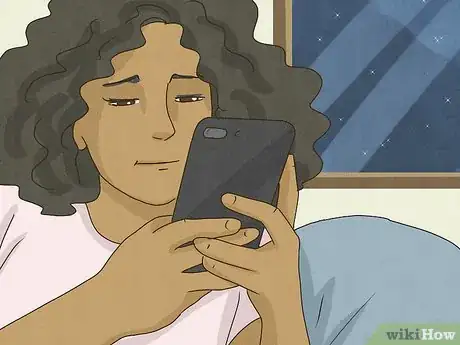This article was co-authored by Julia Yacoob, PhD and by wikiHow staff writer, Kai Hynes. Dr. Julia Yacoob is a Licensed Clinical Psychologist practicing in New York City. She specializes in Cognitive Behavioral Therapy (CBT) for adults coping with a variety of symptoms and life stressors. Dr. Yacoob earned an MS and Ph.D. in Clinical Psychology from Rutgers University, and pursued specialized training at Weill Cornell Medical College, New York Presbyterian Hospital, Memorial Sloan-Kettering Cancer Center, the Institute for Behavior Therapy, and Bellevue Hospital Cancer Center. Dr. Yacoob is a member of the American Psychological Association, Women’s Mental Health Consortium, NYC Cognitive Behavioral Therapy Association, and Association for Cognitive and Behavioral Therapies.
This article has been viewed 64,255 times.
So you have a crush, but you know you can’t be with them. This can be for any number of reasons: they’re taken, they’re toxic, or they’re just not the right fit. Whatever the reason is, this is definitely a confusing place to find yourself in. When your heart and mind are at odds with each other, the best thing to do sometimes is to just walk away. But how do you do this? Luckily for you, we’ve compiled a list of ways to help you stop talking to someone you like and move on!
Steps
Expert Q&A
-
QuestionHow do you get over being lovesick?
 Julia Yacoob, PhDDr. Julia Yacoob is a Licensed Clinical Psychologist practicing in New York City. She specializes in Cognitive Behavioral Therapy (CBT) for adults coping with a variety of symptoms and life stressors. Dr. Yacoob earned an MS and Ph.D. in Clinical Psychology from Rutgers University, and pursued specialized training at Weill Cornell Medical College, New York Presbyterian Hospital, Memorial Sloan-Kettering Cancer Center, the Institute for Behavior Therapy, and Bellevue Hospital Cancer Center. Dr. Yacoob is a member of the American Psychological Association, Women’s Mental Health Consortium, NYC Cognitive Behavioral Therapy Association, and Association for Cognitive and Behavioral Therapies.
Julia Yacoob, PhDDr. Julia Yacoob is a Licensed Clinical Psychologist practicing in New York City. She specializes in Cognitive Behavioral Therapy (CBT) for adults coping with a variety of symptoms and life stressors. Dr. Yacoob earned an MS and Ph.D. in Clinical Psychology from Rutgers University, and pursued specialized training at Weill Cornell Medical College, New York Presbyterian Hospital, Memorial Sloan-Kettering Cancer Center, the Institute for Behavior Therapy, and Bellevue Hospital Cancer Center. Dr. Yacoob is a member of the American Psychological Association, Women’s Mental Health Consortium, NYC Cognitive Behavioral Therapy Association, and Association for Cognitive and Behavioral Therapies.
Clinical Psychologist There are different ways to get over being lovesick. Some people like to spend more time with friends and socialize. But others prefer to be alone, have space, or mourn. You can choose whichever has a healing impact on you.
There are different ways to get over being lovesick. Some people like to spend more time with friends and socialize. But others prefer to be alone, have space, or mourn. You can choose whichever has a healing impact on you. -
QuestionIs it okay to accept your mistakes?
 Julia Yacoob, PhDDr. Julia Yacoob is a Licensed Clinical Psychologist practicing in New York City. She specializes in Cognitive Behavioral Therapy (CBT) for adults coping with a variety of symptoms and life stressors. Dr. Yacoob earned an MS and Ph.D. in Clinical Psychology from Rutgers University, and pursued specialized training at Weill Cornell Medical College, New York Presbyterian Hospital, Memorial Sloan-Kettering Cancer Center, the Institute for Behavior Therapy, and Bellevue Hospital Cancer Center. Dr. Yacoob is a member of the American Psychological Association, Women’s Mental Health Consortium, NYC Cognitive Behavioral Therapy Association, and Association for Cognitive and Behavioral Therapies.
Julia Yacoob, PhDDr. Julia Yacoob is a Licensed Clinical Psychologist practicing in New York City. She specializes in Cognitive Behavioral Therapy (CBT) for adults coping with a variety of symptoms and life stressors. Dr. Yacoob earned an MS and Ph.D. in Clinical Psychology from Rutgers University, and pursued specialized training at Weill Cornell Medical College, New York Presbyterian Hospital, Memorial Sloan-Kettering Cancer Center, the Institute for Behavior Therapy, and Bellevue Hospital Cancer Center. Dr. Yacoob is a member of the American Psychological Association, Women’s Mental Health Consortium, NYC Cognitive Behavioral Therapy Association, and Association for Cognitive and Behavioral Therapies.
Clinical Psychologist Accepting one's mistakes shows real strength and character. It allows you to make amends and honestly connect with others.
Accepting one's mistakes shows real strength and character. It allows you to make amends and honestly connect with others.
References
- ↑ Julia Yacoob, PhD. Clinical Psychologist. Expert Interview. 15 July 2021.
- ↑ https://www.vice.com/en/article/n7j7ab/how-to-get-over-a-crush
- ↑ https://www.vice.com/en/article/n7j7ab/how-to-get-over-a-crush
- ↑ https://www.cosmopolitan.com/sex-love/a22617662/when-your-crush-is-taken/
- ↑ Julia Yacoob, PhD. Clinical Psychologist. Expert Interview. 15 July 2021.
- ↑ https://www.betterhelp.com/advice/how-to/how-to-stop-talking-to-someone-who-is-bad-for-you/
- ↑ Julia Yacoob, PhD. Clinical Psychologist. Expert Interview. 15 July 2021.
- ↑ https://www.betterhelp.com/advice/how-to/how-to-stop-talking-to-someone-who-is-bad-for-you/
- ↑ https://www.seventeen.com/love/dating-advice/a9205/getting-over-your-crush/
- ↑ https://www.cosmopolitan.com/sex-love/a22617662/when-your-crush-is-taken/
- ↑ Julia Yacoob, PhD. Clinical Psychologist. Expert Interview. 15 July 2021.
- ↑ https://www.cosmopolitan.com/sex-love/a22617662/when-your-crush-is-taken/
- ↑ https://www.refinery29.com/en-us/how-to-stop-thinking-about-someone
- ↑ https://www.seventeen.com/love/dating-advice/a9205/getting-over-your-crush/
- ↑ https://www.vice.com/en/article/n7j7ab/how-to-get-over-a-crush






































































